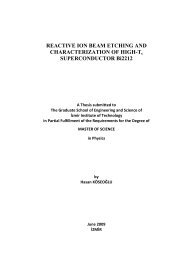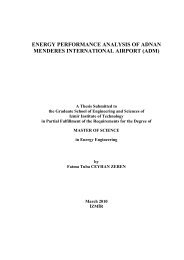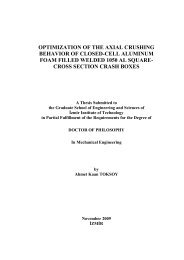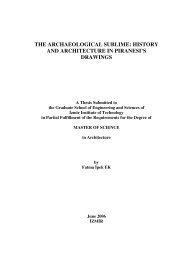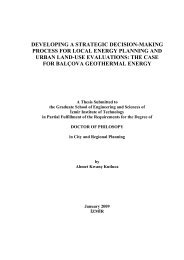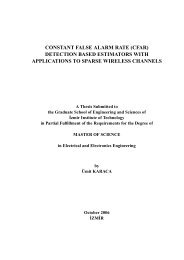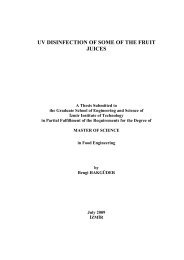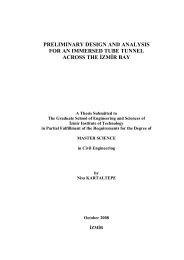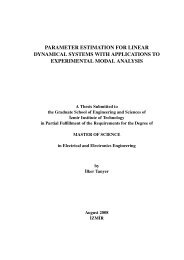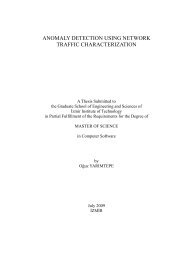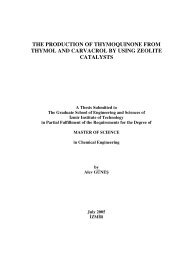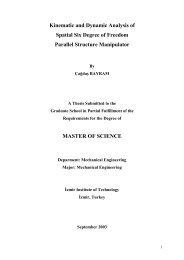a critical evaluation on the concept of justice in planning process
a critical evaluation on the concept of justice in planning process
a critical evaluation on the concept of justice in planning process
Create successful ePaper yourself
Turn your PDF publications into a flip-book with our unique Google optimized e-Paper software.
This acti<strong>on</strong> was brought to Bursa Adm<strong>in</strong>istrative Court and it was rejected<br />
because <strong>of</strong> lapse <strong>of</strong> time by <strong>the</strong> related court <strong>on</strong> 29.11.2000 by menti<strong>on</strong><strong>in</strong>g 60 days <strong>in</strong><br />
proceed<strong>in</strong>g had passed (WEB-16). The problem submitted <strong>in</strong> this case was <strong>the</strong><br />
uncerta<strong>in</strong>ty regard<strong>in</strong>g which <strong>in</strong>stituti<strong>on</strong>s, <strong>in</strong> which scale were resp<strong>on</strong>sible <strong>in</strong> a group <strong>of</strong><br />
events resulted with death and caused by legal/illegal c<strong>on</strong>structi<strong>on</strong>s <strong>in</strong> <strong>the</strong> lands that<br />
should not be developed. There were and <strong>the</strong>re are a lot <strong>of</strong> events resulted with death<br />
because <strong>of</strong> similar reas<strong>on</strong>s. However, <strong>in</strong> <strong>the</strong> extent <strong>of</strong> this study, no data or pattern can<br />
be obta<strong>in</strong>ed about a comprehensive arrangement, authority or existence <strong>of</strong> such an<br />
authority regard<strong>in</strong>g how <strong>the</strong> authorities carry out <strong>the</strong>ir resp<strong>on</strong>sibilities.<br />
4.8. The General Evaluati<strong>on</strong> <strong>of</strong> <strong>the</strong> Plann<strong>in</strong>g Process with a Specific<br />
Emphasis <strong>on</strong> <strong>the</strong> Acti<strong>on</strong>s Initiated <strong>in</strong> Balçova and Narlıdere<br />
Settlements<br />
The general <str<strong>on</strong>g>evaluati<strong>on</strong></str<strong>on</strong>g> <strong>of</strong> all <strong>the</strong> acti<strong>on</strong>s that were <strong>in</strong>itiated from <strong>the</strong> standpo<strong>in</strong>t<br />
<strong>of</strong> plann<strong>in</strong>g and <strong>the</strong> utilizati<strong>on</strong> <strong>of</strong> space can be grouped under <strong>the</strong> follow<strong>in</strong>g sub-<br />
secti<strong>on</strong>s:<br />
1. The overall <str<strong>on</strong>g>evaluati<strong>on</strong></str<strong>on</strong>g> <strong>of</strong> <strong>the</strong> plann<strong>in</strong>g procedures relat<strong>in</strong>g to <strong>the</strong> space that is under<br />
litigati<strong>on</strong> shows <strong>the</strong> majority <strong>of</strong> <strong>the</strong> pla<strong>in</strong>tiffs were property owners, private real pers<strong>on</strong>s<br />
or corporate entities who are directly affected from <strong>the</strong> decisi<strong>on</strong>s that were passed.<br />
2. In <strong>the</strong> legal <strong>process</strong>, <strong>the</strong> parties attribute different mean<strong>in</strong>gs to c<strong>on</strong>cepts such as<br />
“rights”, “equality”, “<strong>in</strong>terest”. Whereas, <strong>in</strong> <strong>the</strong> legal <strong>process</strong>, such c<strong>on</strong>cepts are<br />
<strong>in</strong>terpreted <strong>in</strong> light <strong>of</strong> <strong>the</strong> word<strong>in</strong>g <strong>of</strong> <strong>the</strong> legislati<strong>on</strong>, and are f<strong>in</strong>alized by <strong>the</strong> specialists<br />
<strong>in</strong> accordance with <strong>the</strong>ir own understand<strong>in</strong>g. In <strong>the</strong> Balçova example, it is not possible<br />
to menti<strong>on</strong> c<strong>on</strong>cepts <strong>on</strong> which a c<strong>on</strong>sensus has been reached <strong>in</strong> <strong>the</strong> urban sense.<br />
However, <strong>in</strong> <strong>the</strong> legal <strong>process</strong>, <strong>the</strong> c<strong>on</strong>cepts that are most widely used and that are even<br />
taken as basis, are <strong>the</strong> c<strong>on</strong>cepts <strong>of</strong> “rights”, equality” and “<strong>in</strong>terest”.<br />
3. From <strong>the</strong> standpo<strong>in</strong>t <strong>of</strong> real pers<strong>on</strong>s, <strong>the</strong> term “right” refers to ownership rights and<br />
<strong>the</strong> entitlement to benefit from such rights.<br />
4. N<strong>on</strong>e <strong>of</strong> <strong>the</strong> arguments and <str<strong>on</strong>g>evaluati<strong>on</strong></str<strong>on</strong>g>s <strong>of</strong> <strong>the</strong> parties, c<strong>on</strong>ta<strong>in</strong> any def<strong>in</strong>iti<strong>on</strong>s<br />
regard<strong>in</strong>g <strong>the</strong> term “<strong>in</strong>terest”, how it should be determ<strong>in</strong>ed and how it should be<br />
implemented. C<strong>on</strong>sequently, <strong>the</strong> term “<strong>in</strong>terest” rema<strong>in</strong>s ra<strong>the</strong>r abstract and with<strong>in</strong> this<br />
general c<strong>on</strong>text, it is not clear to identify <strong>the</strong> w<strong>in</strong>n<strong>in</strong>g party and <strong>the</strong> los<strong>in</strong>g party <strong>in</strong> <strong>the</strong><br />
178



